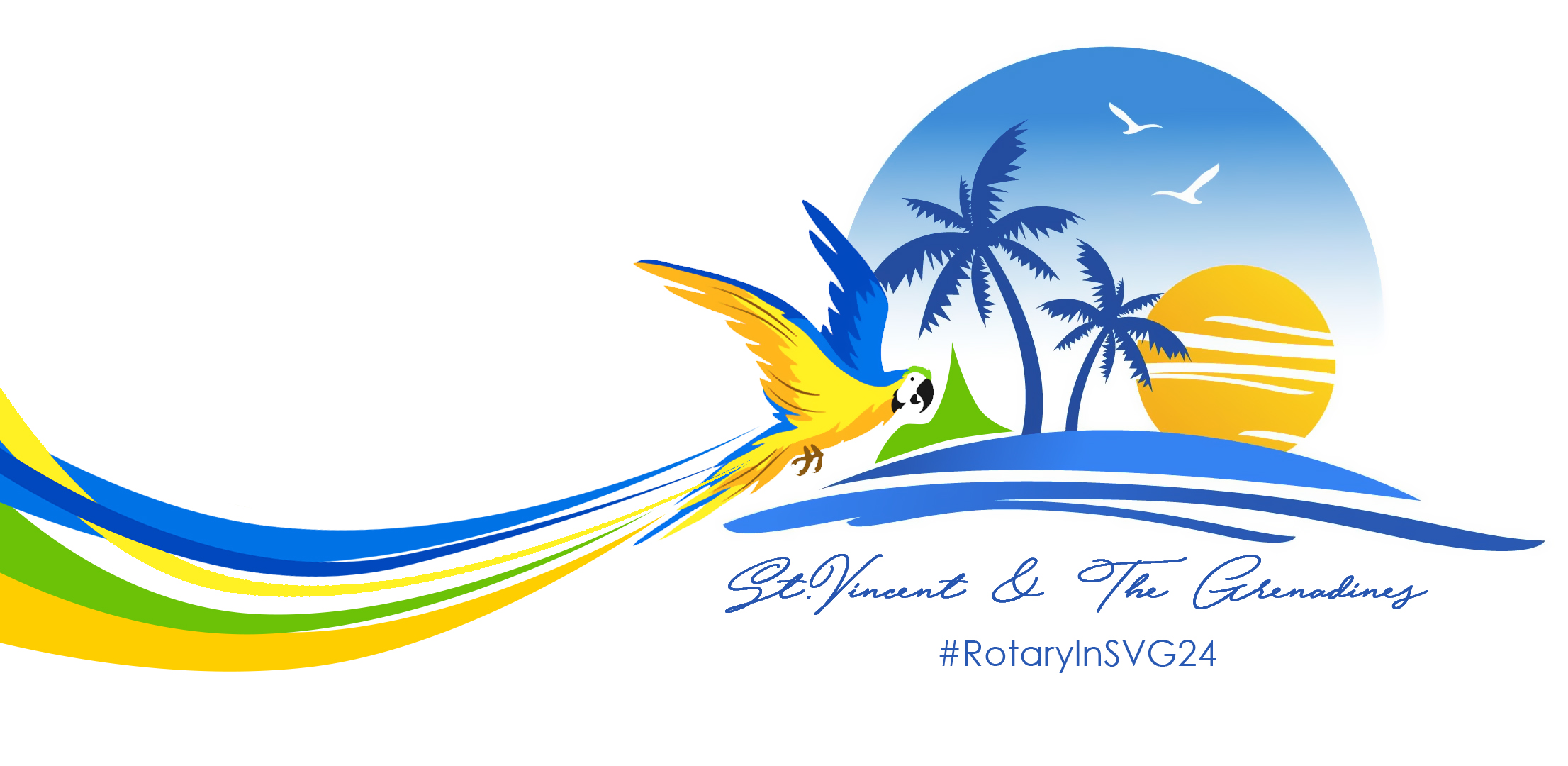Speakers
Meet the Speakers for the District 7030 Conference in St.Vincent and the Grenadines
Rencontrez les conférenciers de la conférence du district 7030 à Saint-Vincent et les Grenadines
Key Note Speaker: Dr.Terri-Karelle Reid
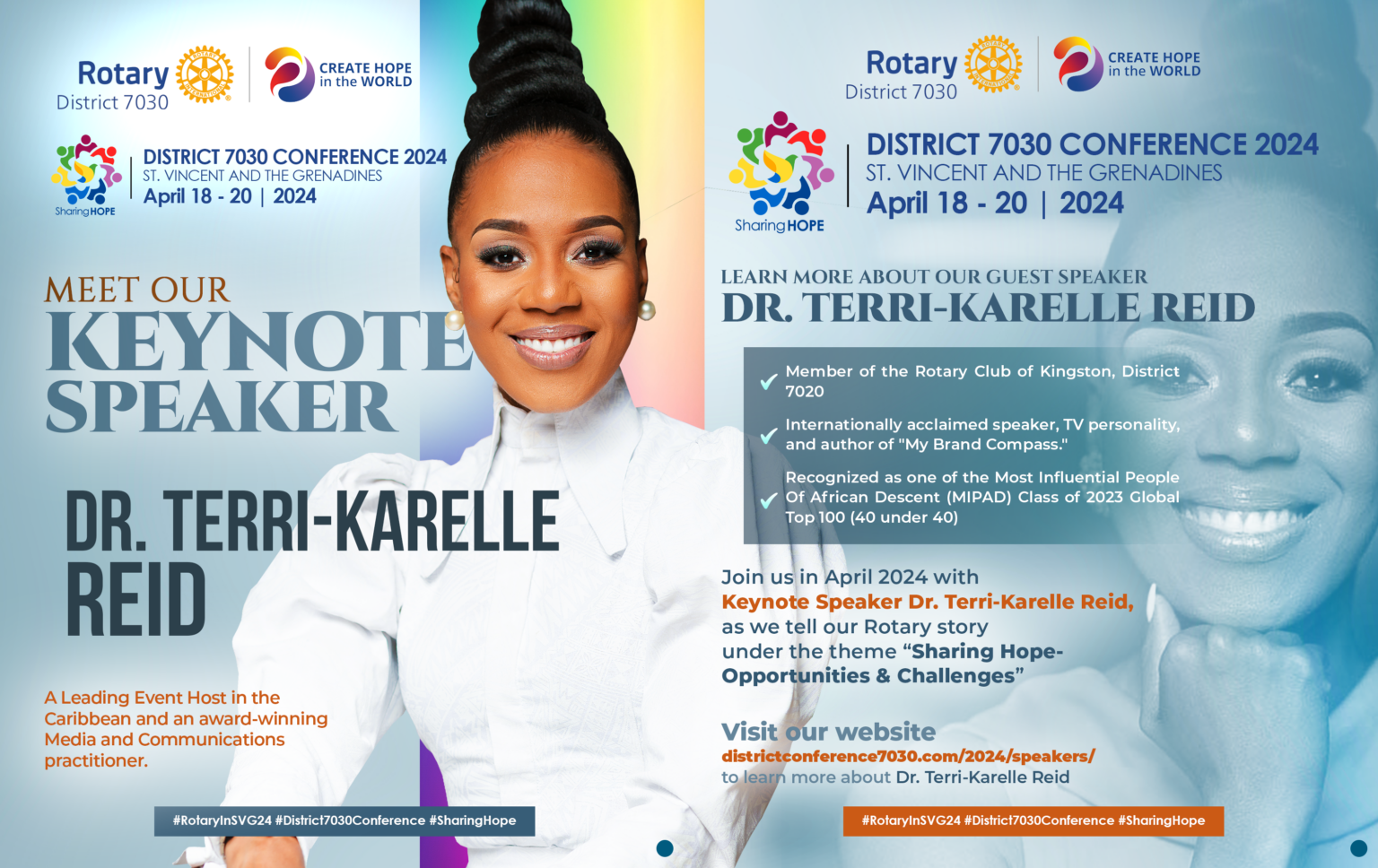
Biography
Dr. Terri Karelle Reid, the veterinarian-turned-media personality, is the Caribbean’s leading event host, an award- winning Media and Communications practitioner, an internationally acclaimed speaker, TV personality, author of “My Brand Compass” and community builder. With her captivating presence and magnetic energy, Terri-Karelle has become a force to be reckoned with in the world of events and entertainment which has earned her a place as one of the Most Influential People Of African Descent (MIPAD) Class of 2023 Global Top 100 list (40 under 40).
Terri-Karelle has built a reputation anchored in excellence and integrity. This bilingual dynamo has a penchant for paying attention to details, solving problems, fostering great relationships, surpassing expectations, and advocating for causes she is passionate about. She has mastered the art of communication, online branding and storytelling and has thrilled audiences across the Caribbean, Europe, Asia and the USA.
Conférencière principale: Dr. Terri-Karelle Reid
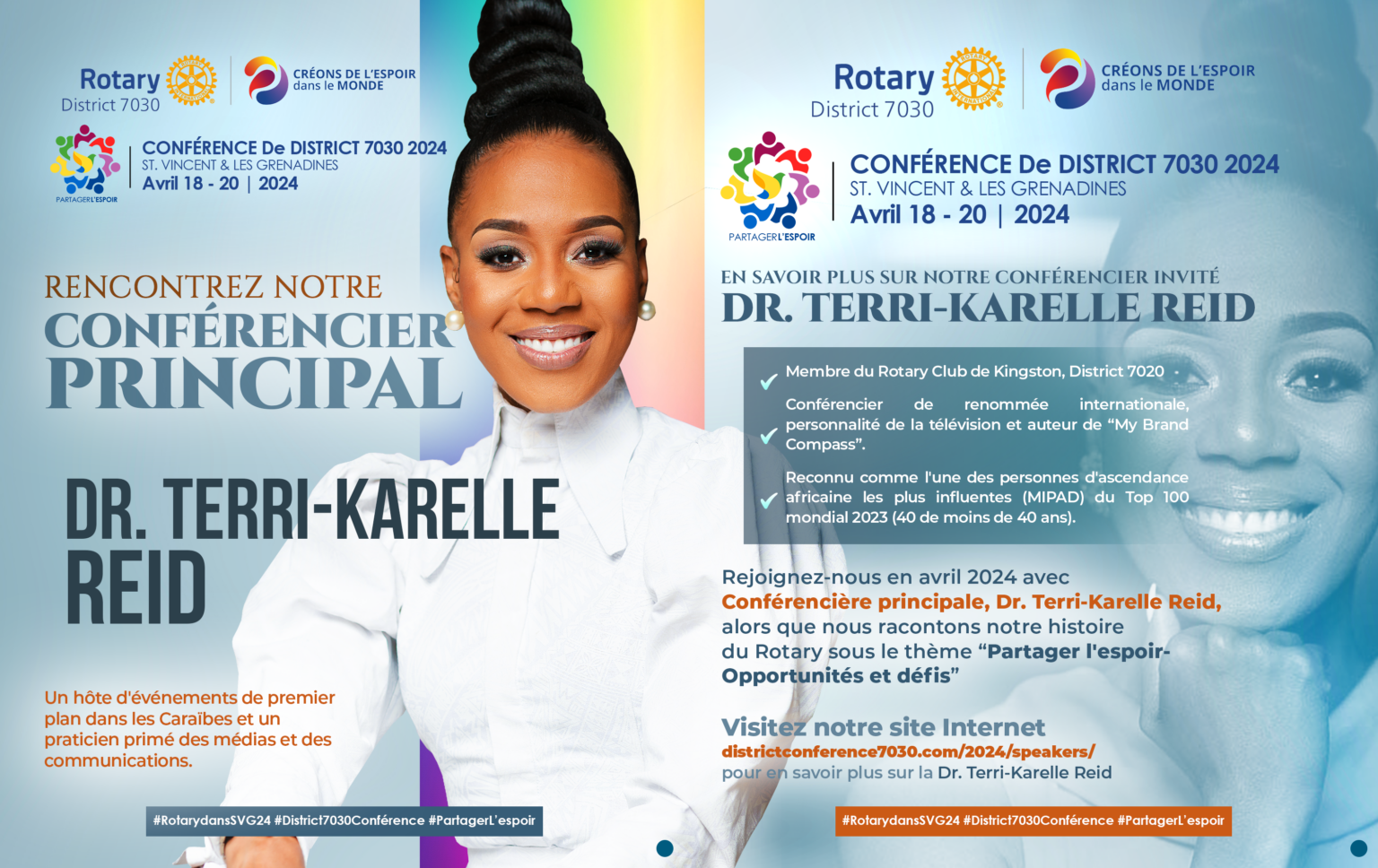
Biographie
Dr Terri Karelle Reid, vétérinaire devenue personnalité médiatique, est la principale animatrice d’événements dans les Caraïbes, une praticienne primée des médias et des communications, une conférencière de renommée internationale, une personnalité de la télévision, l’auteur de « My Brand Compass » et une bâtisseuse de communauté. Avec sa présence captivante et son énergie magnétique, Terri-Karelle est devenue une force avec laquelle il faut compter dans le monde de l’événementiel et du divertissement, ce qui lui a valu une place parmi les personnes d’ascendance africaine les plus influentes (MIPAD) du Top mondial 2023. Liste 100 (40 de moins de 40).
Terri-Karelle s’est bâtie une réputation ancrée dans l’excellence et l’intégrité. Cette dynamo bilingue a un penchant pour prêter attention aux détails, résoudre des problèmes, favoriser de bonnes relations, dépasser les attentes et défendre les causes qui la passionnent. Elle maîtrise l’art de la communication, du branding en ligne et de la narration et a enthousiasmé le public des Caraïbes, d’Europe, d’Asie et des États-Unis.
Guest Speaker: Professor Richard "Richie" Robertson
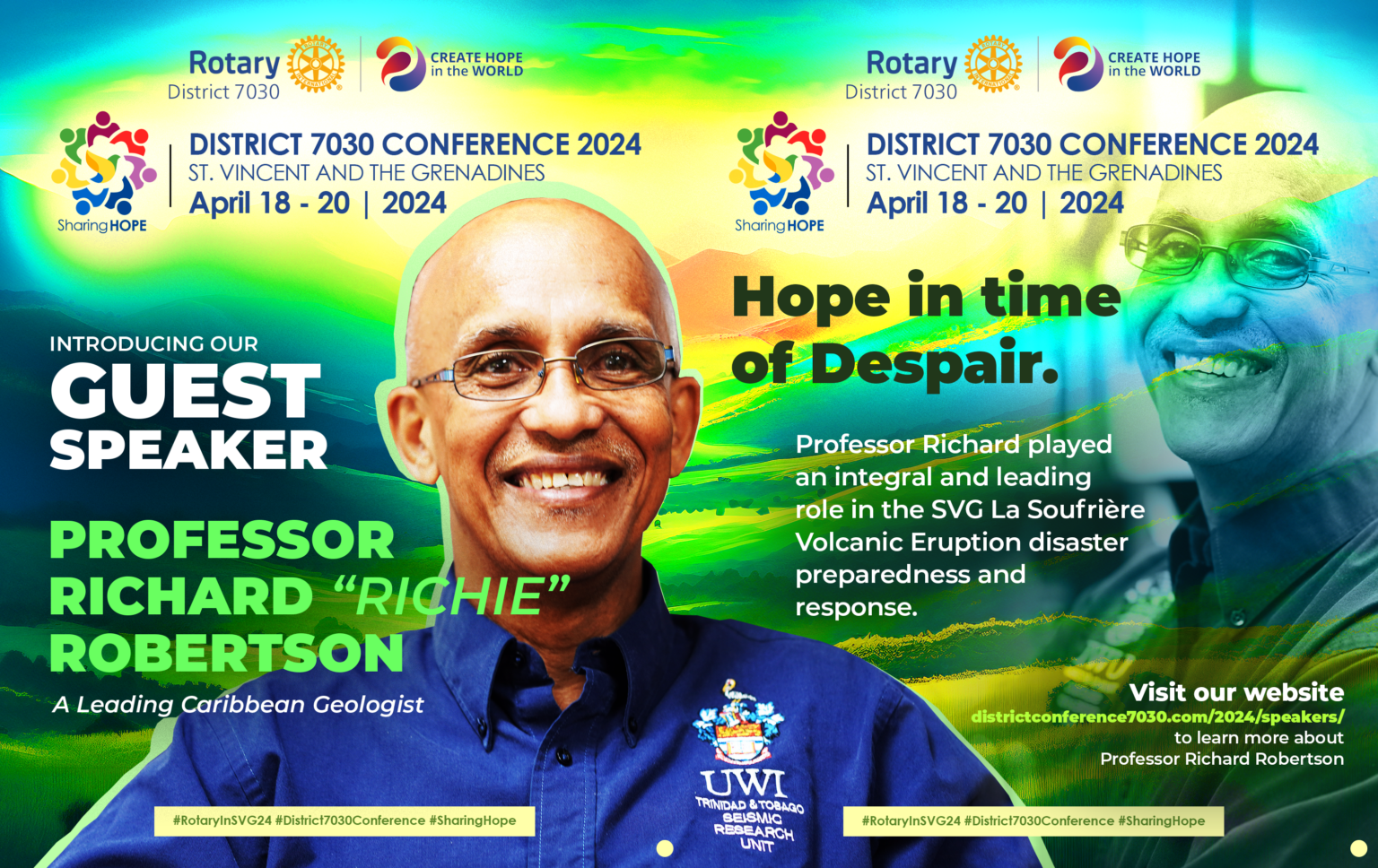
Biography
Prof. Richard (Richie) Robertson is a Vincentian Geologist who has spent the past 36 years in the Caribbean investigating geologic hazards and working with local people and their organizations to reduce vulnerability to these hazards.
His passion for volcanoes was sparked by his experience of the 1979 explosive eruption of La Soufriere volcano of St. Vincent and led to his studying Geology at The UWI Mona Campus and undertaking post-graduate studies at the University of Leeds (Volcanology) and The UWI (Geology).
Prof. Robertson joined the staff at the Seismic Research Unit in 1993 after serving for six years as Head of the volcano-monitoring unit in St. Vincent (the Soufriere Monitoring Unit). He did several tours of duty as Chief Scientist of the Montserrat Volcano Observatory during the period 1995-1999 and was its Director from October 1998–March 1999. He was the Head of the Seismic Research Unit during the period 2004-2008 and then Director of the renamed The UWI Seismic Research Centre from 2008-2011 and 2013-2019.
Since joining the Seismic Research Centre, he has been involved in a variety of activities. These include: the creation of volcanic hazard maps; establishment of volcano monitoring networks; public education and outreach campaigns throughout the Eastern Caribbean and the management of scientific response to the 1995 Soufriere Hills Volcano on Montserrat and the 2020-2021 eruption of La Soufriere Volcano on St. Vincent.
His research interests include all aspects of volcanic hazard and risk, the evolution of volcanism in the Eastern Caribbean, and public engagement in science.
He is enthusiastic about communicating scientific information to vulnerable island communities and building their capacity to cope with hazards.
Conférencier invité: Professeur Richard "Richie" Robertson
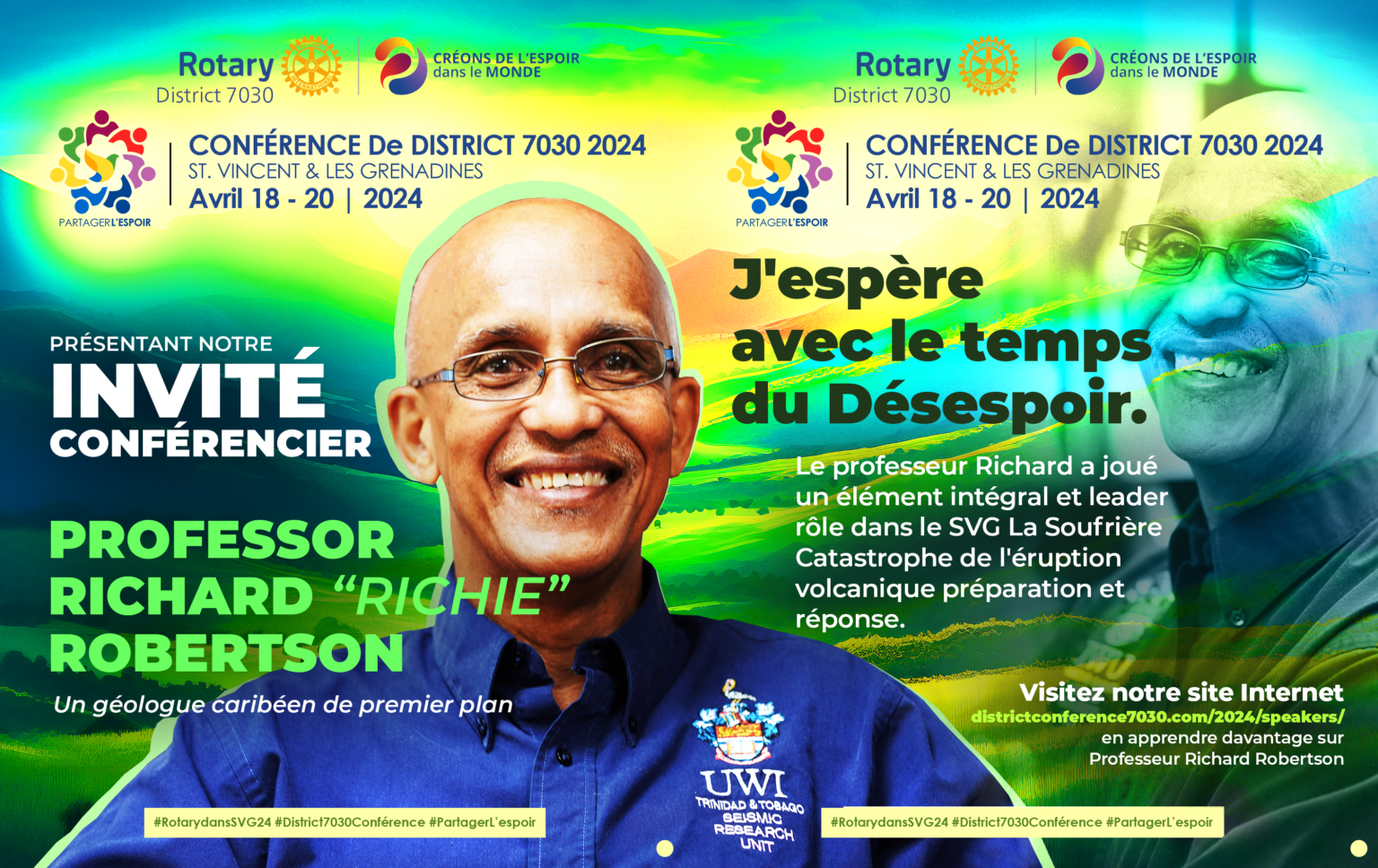
Biographie
Le professeur Richard (Richie) Robertson est un géologue vincentien qui a passé les 36 dernières années dans les Caraïbes à enquêter sur les risques géologiques et à travailler avec la population locale et leurs organisations pour réduire la vulnérabilité à ces risques.
Sa passion pour les volcans a été déclenchée par son expérience de l’éruption explosive du volcan La Soufrière de Saint-Vincent en 1979 et l’a conduit à étudier la géologie au campus UWI Mona et à entreprendre des études de troisième cycle à l’Université de Leeds (volcanologie) et à l’UWI. (Géologie).
Le professeur Robertson a rejoint le personnel de l’unité de recherche sismique en 1993 après avoir servi pendant six ans comme chef de l’unité de surveillance des volcans à Saint-Vincent (l’unité de surveillance de la Soufrière). Il a effectué plusieurs missions en tant que scientifique en chef de l’Observatoire du Volcan de Montserrat au cours de la période 1995-1999 et en a été le directeur d’octobre 1998 à mars 1999. Il a été chef de l’unité de recherche sismique au cours de la période 2004-2008, puis directeur de le rebaptisé Centre de recherche sismique UWI de 2008 à 2011 et de 2013 à 2019.
Depuis qu’il s’est joint au Centre de recherche sismique, il s’est impliqué dans diverses activités. Ceux-ci incluent : la création de cartes des risques volcaniques ; mise en place de réseaux de surveillance des volcans ; des campagnes d’éducation et de sensibilisation du public dans toute la Caraïbe orientale et la gestion de la réponse scientifique au volcan Soufrière Hills de 1995 à Montserrat et à l’éruption 2020-2021 du volcan La Soufrière à Saint-Vincent.
Ses intérêts de recherche portent sur tous les aspects des risques volcaniques, de l’évolution du volcanisme dans les Caraïbes orientales et de l’engagement du public dans la science.
Il est enthousiaste à l’idée de communiquer des informations scientifiques aux communautés insulaires vulnérables et de renforcer leur capacité à faire face aux dangers.
